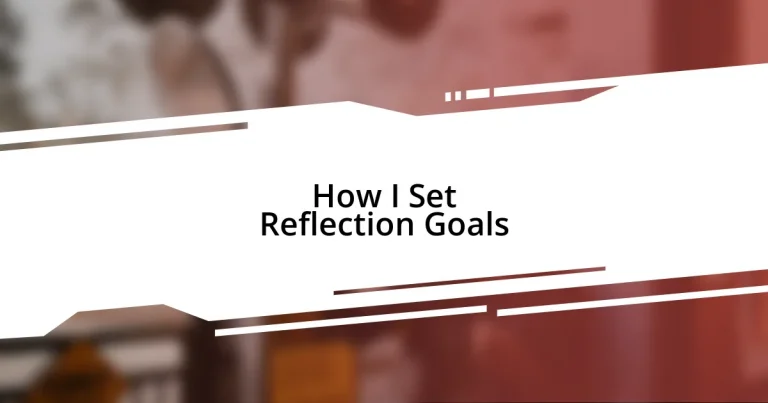Key takeaways:
- Reflection goals help process experiences, fostering personal growth and self-awareness through honest evaluation of thoughts and emotions.
- Setting clear goals provides direction, motivation, accountability, and focus, transforming vague desires into actionable steps.
- Creating an action plan with SMART goals and regular progress tracking allows for manageable steps and adjustments that enhance the goal-setting journey.
- Celebrating achievements, no matter how small, reinforces commitment to progress and can inspire others to pursue their own goals.

Understanding Reflection Goals
Reflection goals are more than just a checklist; they’re a means to deeply process our experiences. I remember a time when I felt overwhelmed by my daily tasks, and it was through setting reflection goals that I discovered the importance of pausing to assess my feelings. Have you ever noticed how that moment of stillness can reveal insights you might otherwise overlook?
These goals act as a compass, guiding us to evaluate our thoughts and reactions honestly. For instance, after completing a challenging project, I’d ask myself what I learned about my strengths and weaknesses. This practice not only helps in personal growth but also cultivates a habit of self-awareness. Isn’t it fascinating how a simple question can lead to unexpected revelations?
When we focus on reflection goals, it’s crucial to approach them with an open heart and mind. I’ve found that the more vulnerable I am during this process, the more authentic my insights become. Have you ever hesitated to acknowledge your feelings about a situation? Allowing yourself to sit with those emotions is where the real magic happens, transforming challenges into valuable lessons.
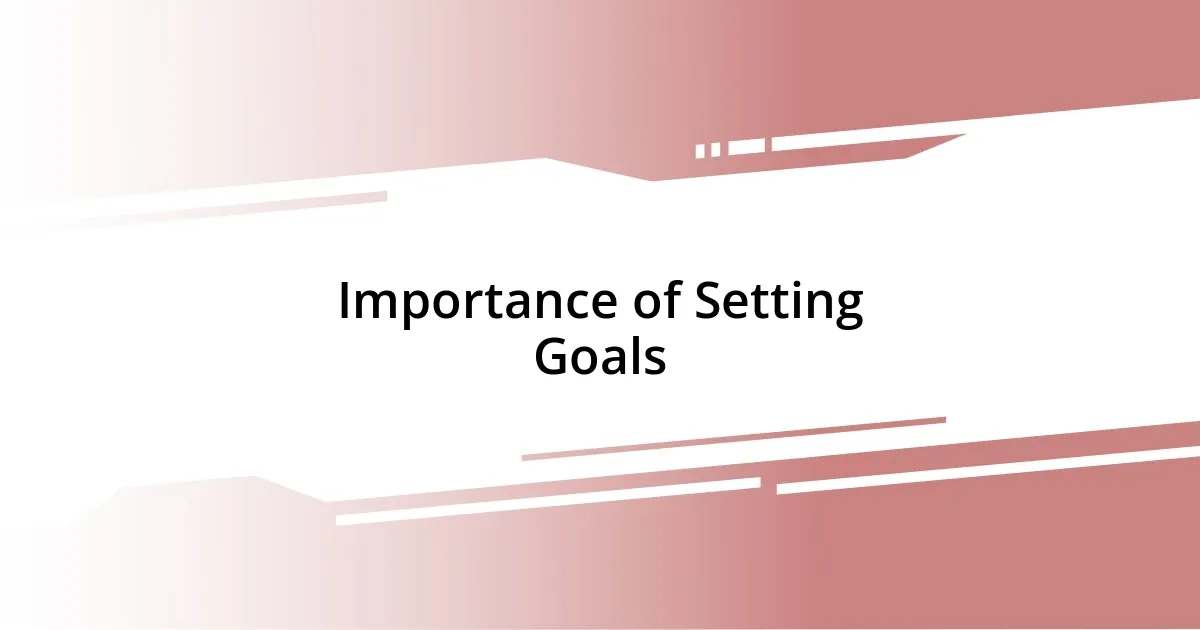
Importance of Setting Goals
Setting goals is crucial because they provide direction and purpose. I recall a period in my life when I drifted aimlessly, unsure of what I truly wanted. It was in setting clear goals that I found my motivation, igniting a passion I didn’t know I had. When we articulate our objectives, we transform vague desires into actionable steps, which makes the journey feel so much more fulfilling.
Here are a few reasons why setting goals matters:
- Clarity: Goals clarify our intentions, making it easier to prioritize our actions.
- Motivation: They act as fuel, providing the drive to push through challenges.
- Accountability: Goals create a sense of responsibility, helping us track our progress and stay committed.
- Growth: They encourage us to step outside our comfort zones, fostering personal development.
- Focus: Setting goals helps eliminate distractions and maintain concentration on what truly matters.

Steps to Identify Personal Values
Identifying personal values is a journey that starts with introspection. I often reflect on moments that triggered strong emotions—whether joy, frustration, or disappointment. For example, I once had a heated discussion with a friend about honesty, which made me realize that integrity is a core value for me. Have you ever noticed how certain experiences resonate more deeply than others? Those feelings can help pinpoint what truly matters in your life.
Another effective step is to articulate what you admire in others. When I think about people I respect, I often list qualities like empathy, resilience, and creativity. This exercise not only helps me clarify my values but also inspires me to embody those traits myself. It’s like holding up a mirror and seeing what reflections captivate your spirit. What qualities do you find yourself drawn to?
Lastly, I find it helpful to evaluate choices and consequences in my life. I ask myself questions like, “Did the decision align with my values?” This practice reveals patterns and guides future decisions. One time, after choosing a job that didn’t align with my passion, I realized how critical it is for me to engage in work that resonates with my values. Learning from those experiences can truly shape our personal value compass.
| Step | Description |
|---|---|
| Reflect on Emotions | Identify moments that triggered strong feelings to uncover your core values. |
| Admire Qualities | List traits in people you respect to clarify values you want to embody. |
| Evaluate Choices | Assess past decisions to learn how they align with your personal values. |
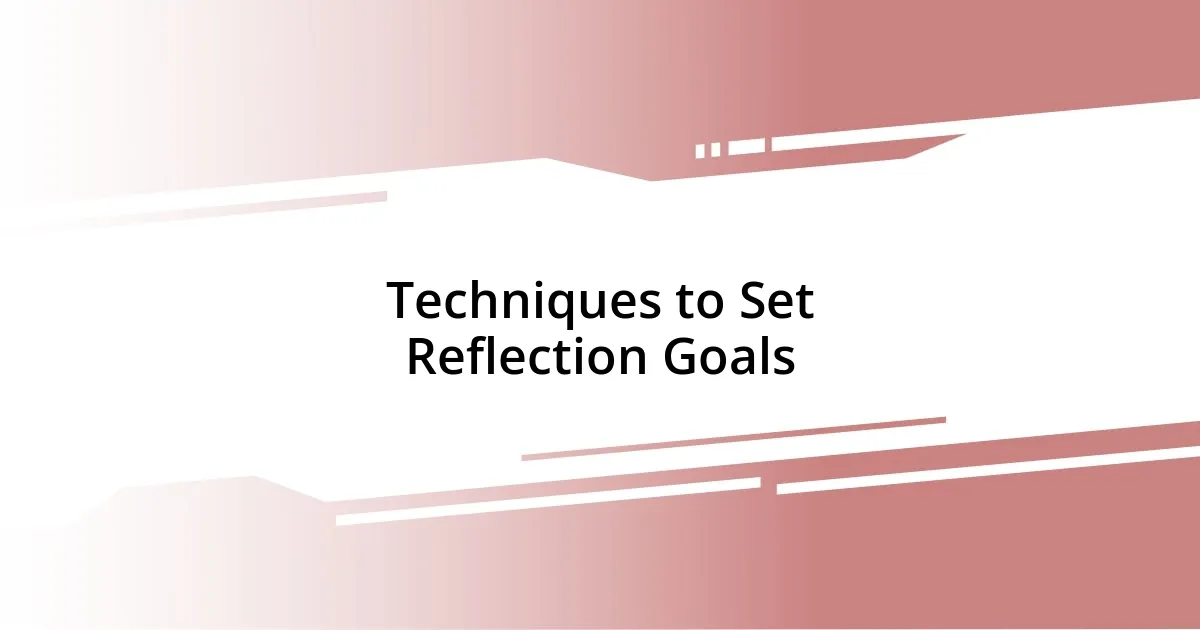
Techniques to Set Reflection Goals
To set effective reflection goals, I often start with creating SMART goals—Specific, Measurable, Achievable, Relevant, and Time-bound. For instance, rather than simply stating my desire to be more mindful, I define it as “practicing mindfulness meditation for 10 minutes each day for a month.” This approach not only clarifies my intention but also allows me to track my progress easily. Have you ever felt lost in the sea of good intentions? SMART goals can serve as a lighthouse to guide you.
Another technique that has profoundly impacted my goal-setting process is journaling. I dedicate a few minutes each day to write down my thoughts, feelings, and reflections on my experiences. This practice brings my emotions into focus and helps me identify recurring themes. On one occasion, I discovered through journaling that I consistently felt fulfilled after engaging in creative activities, which prompted me to set goals around pursuing art more regularly. What might you uncover about yourself if you took the time to jot down your thoughts daily?
Pairing goal-setting with visualization is also incredibly useful. I imagine achieving my goals in vivid detail, from the accomplishment’s feelings to the impact it has on my life. This mental exercise has helped me stay committed, especially during tough times. Recently, I visualized myself completing a challenging project at work, and that mental image fueled my determination to succeed. How powerful do you think it is to see your success in your mind before it happens? By incorporating visualization, your goals become not just words on paper but vivid blueprints of your desired future.
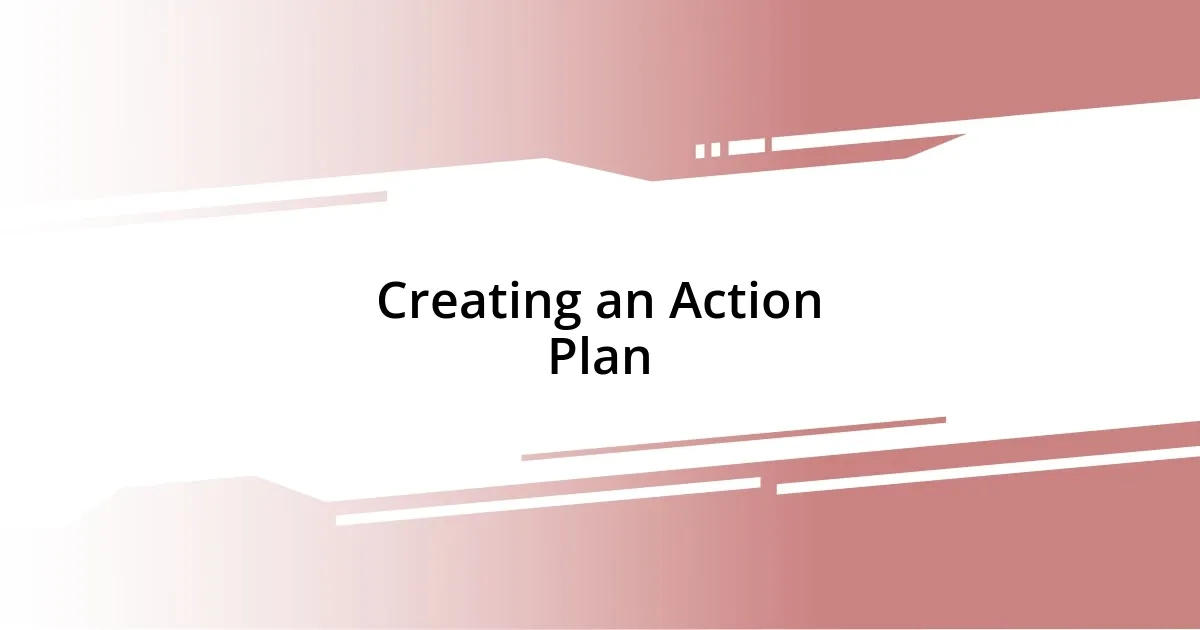
Creating an Action Plan
Creating an action plan is key to turning your reflection goals into reality. I remember when I first created an action plan for improving my time management skills. I broke down my larger goal into smaller, manageable tasks, like blocking off specific time slots for focused work. This structured approach made my goals less daunting and helped me feel more in control. Have you ever felt overwhelmed by a big goal? Breaking it down can make all the difference.
In my experience, a timeline is essential when crafting an action plan. For example, I wanted to enhance my public speaking abilities, so I set a timeline to join a local Toastmasters group within the next month. Having a clear deadline made me more accountable, and I noticed a boost in my motivation. How often do you set deadlines for yourself? I’ve learned that realistic timelines keep us focused and on track.
Finally, I find it incredibly beneficial to regularly review and adjust my action plan. It’s like tuning an instrument; sometimes, you have to tweak the strings to get the right sound. When I was working on my personal fitness goals, I reassessed my routine every few weeks and made adjustments based on what was or wasn’t working. This flexibility not only kept me engaged but also allowed me to celebrate mini victories along the way. What adjustments could you make to stay aligned with your goals? Embracing change can enhance your journey and keep your goals in sight!
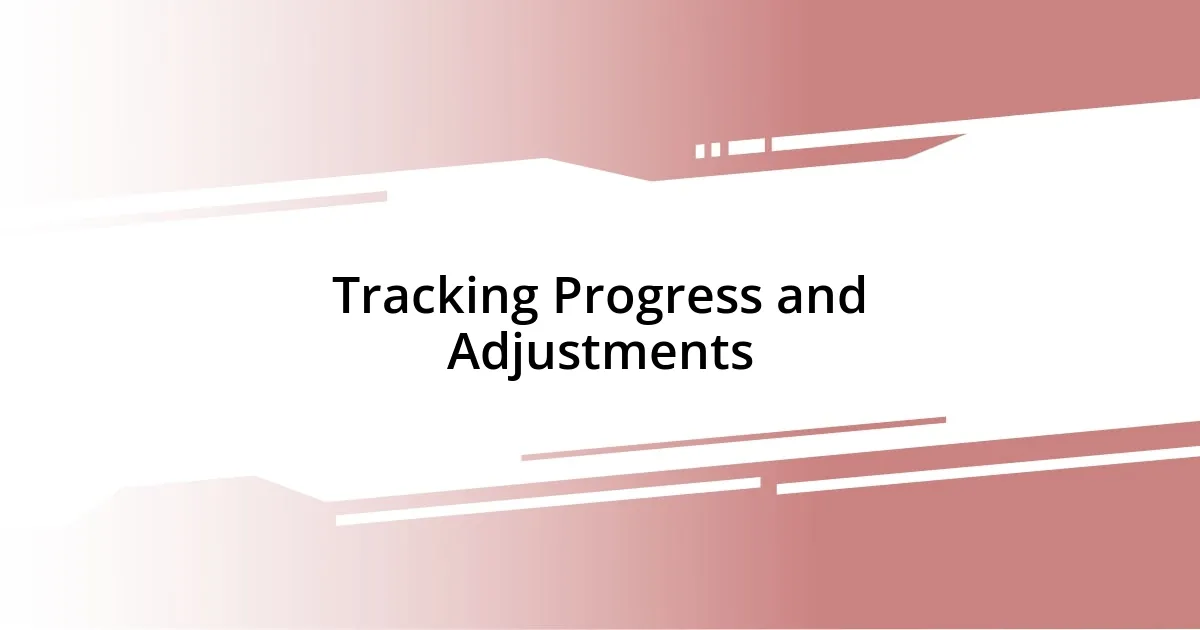
Tracking Progress and Adjustments
Tracking my progress is an essential aspect of achieving my reflection goals. I often use a simple tracking app that allows me to log my daily activities and moods. For example, when I committed to my mindfulness practice, I noticed that days I felt more focused and energized coincided with consistent meditation. Isn’t it fascinating how data can reveal patterns that might otherwise go unnoticed?
Adjustments are equally crucial in this journey. I vividly recall a time when I aimed to improve my communication skills but found myself struggling during conversations. After tracking my interactions, I realized that my anxiety peaked before public speaking events, leaving little room for improvement. By adjusting my approach and incorporating relaxation techniques beforehand, I noticed a significant change—not just in my performances, but in how I felt during those moments. Have you ever discovered that a small tweak made a massive difference?
Reflecting on this process often leads to surprising insights. As I revisited my progress at the end of each week, I uncovered aspects of my approach that needed reevaluation. While I initially thought a rigid routine would enhance my productivity, I soon learned that incorporating breaks significantly revived my creativity. How might you benefit from pausing and reassessing your strategy? By allowing flexibility, I cultivated a dynamic relationship with my goals, making the journey all the more rewarding.
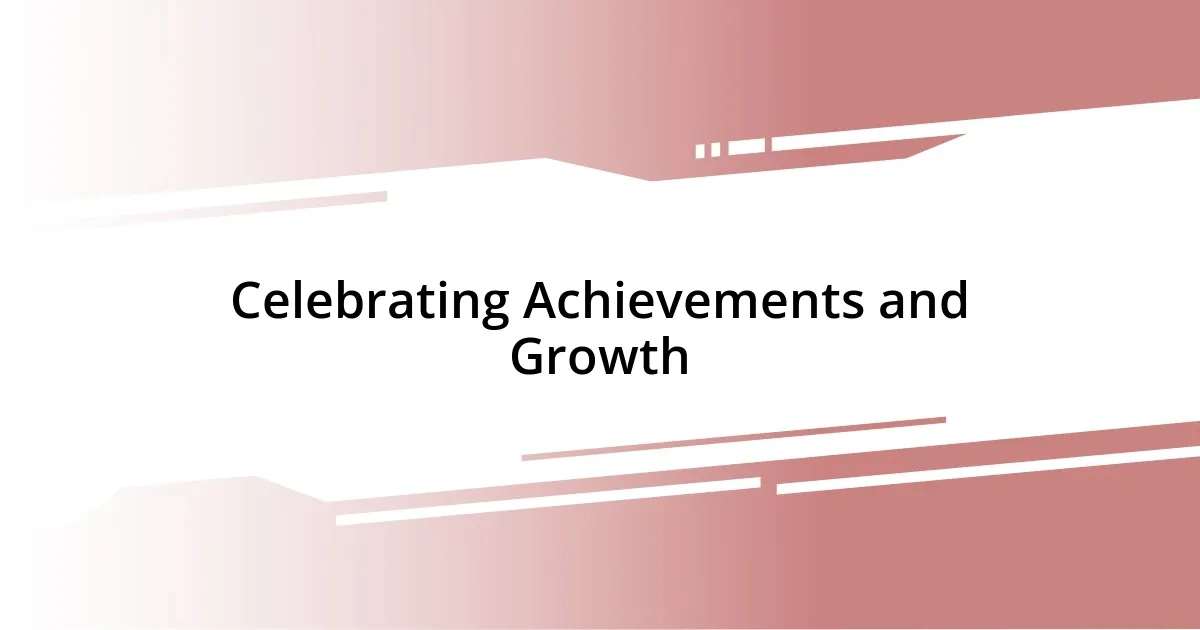
Celebrating Achievements and Growth
Celebrating achievements is something I believe we often overlook in our pursuit of growth. I distinctly remember the day I hit a major milestone in my writing journey—I finished my first draft of a book. Instead of just checking it off the list, I treated myself to a small celebration with friends. Reflecting on that moment brought me immense joy. Have you ever acknowledged a win that made you smile long after? Taking the time to celebrate can reinforce our commitment to progress.
Growth can often feel like an uphill battle, but recognizing our achievements along the way makes it feel more like a shared journey. Recently, I started a new fitness routine, and every time I completed a workout, I marked it off on a calendar. I loved seeing those little checks add up! It reminded me that every effort counts, no matter how small. What methods do you use to acknowledge your progress? Sometimes, a visual representation of our hard work can spark further motivation.
Additionally, I find that sharing my achievements with others amplifies their significance. When I completed an online course, I posted about it on social media. The outpouring of congratulations from friends and family not only made me feel proud but also inspired others to pursue their own goals. It’s interesting how celebrating together can create a ripple effect of motivation. How do you think discussing your successes could impact those around you? In my experience, celebrating achievements fosters a sense of community, encouraging everyone to strive for their own personal growth.












